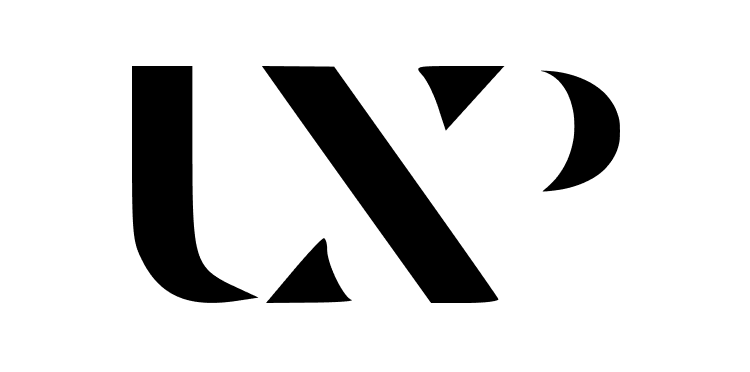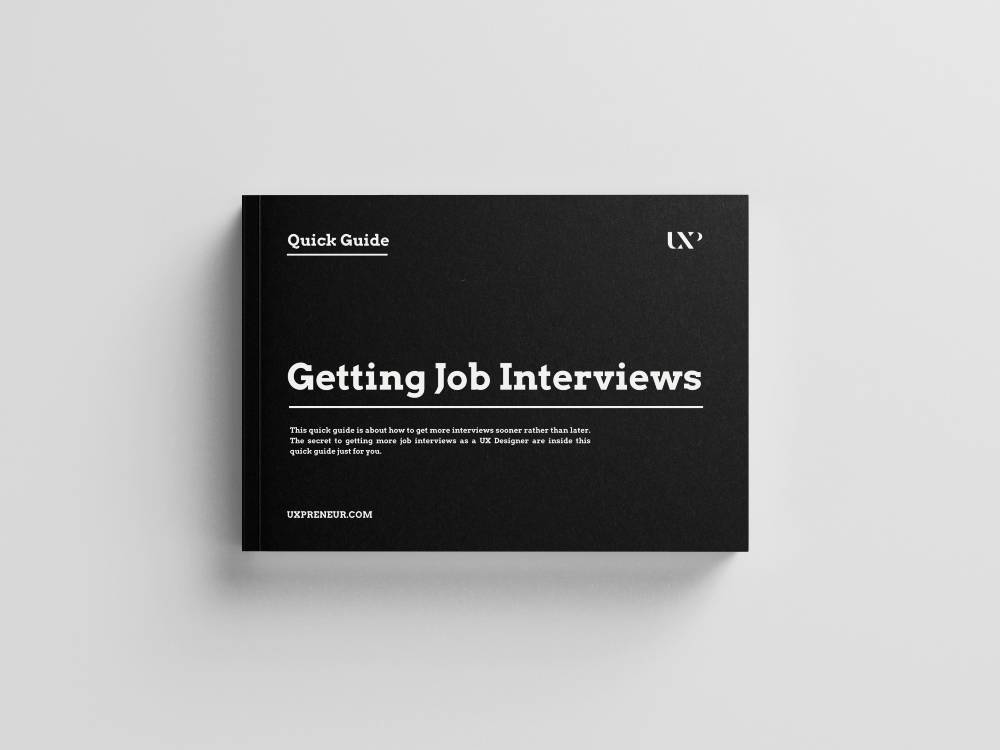Never Unemployed.
Always Self-Employed.
The only program that treats you like a UX Design Entrepreneur NOT a student.
- Hired Faster
- Work Remote
- Art Therapy
- Less Physically Demanding
- Design Your Life
- Financial Freedom
Want to get to Monthly Recurring Revenue (MRR) ASAP? "Name Your Own Price" for this quick guide on Getting Job Interviews sooner rather than later.
Inside you'll learn how to use your network, and turn the tables on hiring managers. Interview them instead of them just interviewing you.
After all, we are UX Design Entrepreneurs and we need to understand our users. This guide shows you how to get job interviews quicker.
This guide is designed to help UX Design Entrepreneurs continuously improve their visual design skill through consistent evolution. When complex is easy and simplicity is hard, it prevents us from looking our best version of ourselves. This plays a huge role during the hiring process. The better you are at visual communication design, and indeed your UI design, the more likely you'll be favored over someone else.
What is UXpreneur?
A mix between user experience designer (UX Design) and entrepreneurship, UXPRENEUR was born out of this notion that eventually we all liberate ourselves from the rat race.
Essentially, you're staking a claim as self-employed contractor. A personal brand that performs the service of UX Design for clientele. Eventually making automations using Zapier, Bubble, and Chat GPT.
Instead of doing vanity UI Porn, you treat projects like scientific experiments. Just like a psychologist, you perform research through design testing usability.
Entrepreneurs, marketers, and UX Researchers all share similar hurdles. They have to recruit manually before scaling. So, too does the UX Design Entrepreneur or UXPRENRUER.
This website is all about lifting the veil of wool from the eyes of those who think they're not worthy of the title UX Design Entrepreneur. For those who think to their self "I'm not worthy unless someone pays me." Well, I'm here to tell you that the days of feudalism are over.
There's no king to ordain you a knight. Be that which you want to be. UX or user experience is an outcome oriented way of measuring the impact of our tasks, duties, and responsibilities as designers.
UXpreneur = UX Design Entrepreneur
Instead of making something look pretty and handing it off in a relay race to our developer team mates, we instead include both users and developers along for the ride known as the design research process.
This enables our teams and ourselves to discover usability issues prior to them having a big financial hurt in the market. When combining the hallmarks of marketer, entrepreneur, and UX researcher into one you'll feel more confident when discussing your portfolio of business pursuits rather than scholastic faux assignments.
UXPRENEUR was created to debunk this stereotype and change paradigms that when you invest in your own education you are an entrepreneur NOT just another recent grad. So, then what about our friend and counterpart Entrepreneur? Put simply, an entrepreneur is anyone who funds their own pursuits into business. As a UX Design Entrepreneur you're practicing design thinking and marketing almost simultaneously.
The trouble is today that many people frown upon funding one's own education in college or bootcamp, because they deem them as "not real experience." Well, I'm here to tell you that you don't need to get a college degree or certificate to call yourself a UX Designer or any type of designer for that matter. Instead you merely need to put in the work on your own projects, and voila you're a UX Design Entrepreneur.
Some people call them "passion projects" or "side projects." In school they dub them "capstone projects." Well, in business and as an entrepreneur you'll have many failed startups before one succeeds. And hiring managers take these attempts more seriously than those from a school assignment.
Believe me I've had close to a thousand mentees over the past 5 years from UCSD and Springboard provide qualitative feedback that hiring managers are asking for "real experience" rather than "school projects." So, you can do yourself a lot of good by
Dub Thyself UX Design Entrepreneur or UXPRENEUR if you'd like.
Don’t condescend yourself as “Aspiring” UX Designer. It’s a red flag to hiring managers who look for confidence rather than insecurity.
Rather take pride in yourself as an UX Design Entrepreneur or UXPRENEUR if you’d like. This way you practice business and not just superfluous projects.
Protip:
Buy Domain Names for Your Projects in Your Portfolio and Use the Advertising Copy you wrote in our case study for the landing pages. It makes your project look real, and you can start using plugins to measure quantitative metrics. I use Porkbun for low cost domains, and Hostinger for server hosting. In addition, I use WordPress and Elementor for CMS and to design the landing pages themselves.

Principles of UX Design Entrepreneur
I’ve been a long time fan of The Futur, formerly The Skool, under Jose Caballer, and Chris Do’s leadership. They’ve been like mentors to me during my slumps in my career. In this video they talk about design as entrepreneur. Yet, the principles that I’m about to show you differ a bit from the good entrepreneurial design principles Caballer and Do mention.
I’m going to speak to principles that I’ve understood over my lifetime. Since, 2001 I’ve been an entrepreneur, and as it turns out it runs in my family. My mom is also self-employed. So, there is a openness and tendency for me to be wired this way. My hope is to help you too.
1. Visionary
Entrepreneurs have a long-term vision of a better world 5, 10 years out.
2. Leadership
Leadership is not management. Leadership is taking action and those that look up to you follow. Without followers there’s no leader. So, it can feel lonely sometimes. You’ve got to eat a lot of humble pie.
If you have a lot of ego, leadership may be a challenge. Leadership takes being the last person to speak, and you’ve got to take action in the face of fears. Once you show others how unscathed you are, they follow. Like Derek Sivers says, “In order to start a movement, you’ve got to clown around and stick out like a sore thumb. Then treat your first follower as equal.”
3. Core Problems
“Solutioneering” is the act of working up solutions without fully understanding the problem it set out to solve. Entrepreneurs go deeper to the core problem much like design thinkers. Use the 5 Whys to get to the core problem as best you can. Entrepreneurs cultivate an audience of people who share a problem and then create a solution for them rather than create a solution and persuade people through manipulation that they need your solution for some reason.
4. Risk
“Creativity + Risk = Reward” — Mark Dziersk. In order to reap the benefits of rewards we have to take risk. We cannot just be “creative” and the reward will come. Entrepreneurs know this and seek out risk where everyone else turns around.
5. Ethics
When we are entrepreneurs we’re practicing leadership and taking risks, and the people we meet along the way become a part of our network. Through integrity, character, and leadership we practice ethics. Ethics involves respecting our users, customers, clientele, partners, contractors, and employees. Only then does our team in turn respect and practice ethical design in their duties and daily tasks. If we practice unethical business practices like Dark UX, then we set an example to others too. This requires an entrepreneur to practice ethical business and design.
6. Stay Foolish
Practicing user experience design for entrepreneurs we need to stay humble not only for leadership, but also to remain open minded. This is what I mean by “staying foolish” which I stole from Steve Jobs Stanford address. We can never get so full of ourselves that we know it all, and that our ideas are fool proof. They’re not.
When we believe our product/feature/service is obviously the right thing to build and act upon, we are practicing arrogance rather than confidence. Ego over Pragmatism. Instead the entrepreneur knows what they don’t know outweighs what they do know. That’s why you would hire people and take their ideas into consideration being inclusive rather than close minded.
7. Measure
“You cannot improve what you don’t measure” — Famous Quote by Peter Drucker. As entrepreneurs we need to measure everything in our pirate metrics funnel. From Awareness to Referrals, we need to keep a close eye on our conversion rates to discover where the bottle neck is. So, too in our personal lives do we need to measure and account for the time we spend on business vs life.
I’m a firm believer we’re in business to spend time with our families which is the ultimate investment because it’s our legacy. I’m sure there are people in your family you’ve not spoken with for quite some time. Where that’s a leadership issue, the only way to improve upon that relationship is through measuring your performance in nurturing it. Yet, when it comes to our business we want to stay on top of our analytics. I use Google Analytics for tracking mine.
8. Innovation = Revolution
As an entrepreneur myself, I’ve had to come to terms with the author of Win Without Pitching Manifesto, Blair Enns’ “Innoficiency Principle.” It states that “innovation and efficiency are opposable objectives you cannot increase one without decreasing the other. This led me to understand there are really two tracks at any organization.
The efficiency optimization track in which we discussed under “measure” principle, and the innovation track. Innovation is disruptive and revolutionary. It’s a birthday surprise, you don’t know if the person will like it or not. It’s risky that way. Although there are 4 quadrants in the innovation matrix, I would argue only 3 abide by the innoficiency principle. Disruptive, Architectural, and Radical. This is because efficiency is evolution; where as, innovation is revolution.


